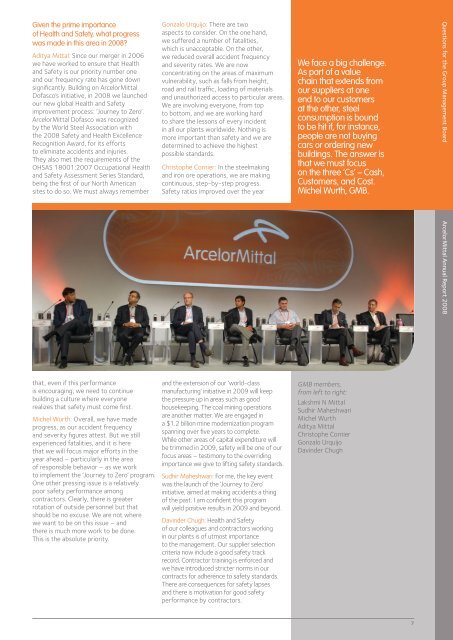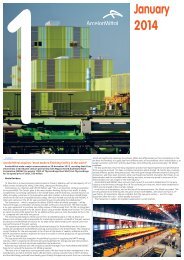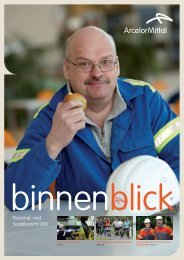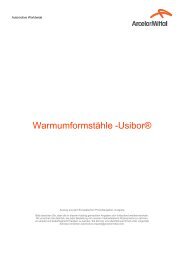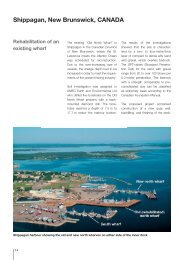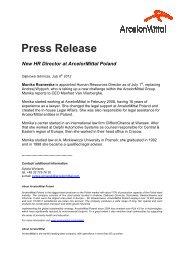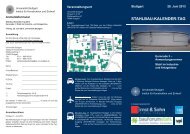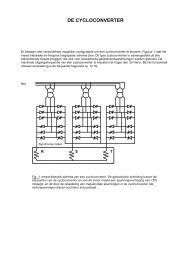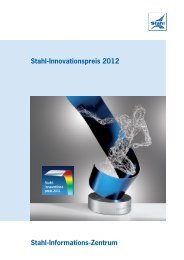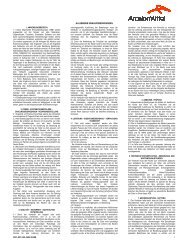ArcelorMittal Annual Report 2008
ArcelorMittal Annual Report 2008
ArcelorMittal Annual Report 2008
Create successful ePaper yourself
Turn your PDF publications into a flip-book with our unique Google optimized e-Paper software.
Given the prime importance<br />
of Health and Safety, what progress<br />
was made in this area in <strong>2008</strong>?<br />
Aditya Mittal: Since our merger in 2006<br />
we have worked to ensure that Health<br />
and Safety is our priority number one<br />
and our frequency rate has gone down<br />
significantly. Building on <strong>ArcelorMittal</strong><br />
Dofasco’s initiative, in <strong>2008</strong> we launched<br />
our new global Health and Safety<br />
improvement process: ‘Journey to Zero’.<br />
<strong>ArcelorMittal</strong> Dofasco was recognized<br />
by the World Steel Association with<br />
the <strong>2008</strong> Safety and Health Excellence<br />
Recognition Award, for its efforts<br />
to eliminate accidents and injuries.<br />
They also met the requirements of the<br />
OHSAS 18001:2007 Occupational Health<br />
and Safety Assessment Series Standard,<br />
being the first of our North American<br />
sites to do so. We must always remember<br />
that, even if this performance<br />
is encouraging, we need to continue<br />
building a culture where everyone<br />
realizes that safety must come first.<br />
Michel Wurth: Overall, we have made<br />
progress, as our accident frequency<br />
and severity figures attest. But we still<br />
experienced fatalities, and it is here<br />
that we will focus major efforts in the<br />
year ahead – particularly in the area<br />
of responsible behavior – as we work<br />
to implement the ‘Journey to Zero’ program.<br />
One other pressing issue is a relatively<br />
poor safety performance among<br />
contractors. Clearly, there is greater<br />
rotation of outside personnel but that<br />
should be no excuse. We are not where<br />
we want to be on this issue – and<br />
there is much more work to be done.<br />
This is the absolute priority.<br />
Gonzalo Urquijo: There are two<br />
aspects to consider. On the one hand,<br />
we suffered a number of fatalities,<br />
which is unacceptable. On the other,<br />
we reduced overall accident frequency<br />
and severity rates. We are now<br />
concentrating on the areas of maximum<br />
vulnerability, such as falls from height,<br />
road and rail traffic, loading of materials<br />
and unauthorized access to particular areas.<br />
We are involving everyone, from top<br />
to bottom, and we are working hard<br />
to share the lessons of every incident<br />
in all our plants worldwide. Nothing is<br />
more important than safety and we are<br />
determined to achieve the highest<br />
possible standards.<br />
Christophe Cornier: In the steelmaking<br />
and iron ore operations, we are making<br />
continuous, step-by-step progress.<br />
Safety ratios improved over the year<br />
and the extension of our ‘world-class<br />
manufacturing’ initiative in 2009 will keep<br />
the pressure up in areas such as good<br />
housekeeping. The coal mining operations<br />
are another matter. We are engaged in<br />
a $1.2 billion mine modernization program<br />
spanning over five years to complete.<br />
While other areas of capital expenditure will<br />
be trimmed in 2009, safety will be one of our<br />
focus areas – testimony to the overriding<br />
importance we give to lifting safety standards.<br />
Sudhir Maheshwari: For me, the key event<br />
was the launch of the ‘Journey to Zero’<br />
initiative, aimed at making accidents a thing<br />
of the past. I am confident this program<br />
will yield positive results in 2009 and beyond.<br />
Davinder Chugh: Health and Safety<br />
of our colleagues and contractors working<br />
in our plants is of utmost importance<br />
to the management. Our supplier selection<br />
criteria now include a good safety track<br />
record. Contractor training is enforced and<br />
we have introduced stricter norms in our<br />
contracts for adherence to safety standards.<br />
There are consequences for safety lapses<br />
and there is motivation for good safety<br />
performance by contractors.<br />
We face a big challenge.<br />
As part of a value<br />
chain that extends from<br />
our suppliers at one<br />
end to our customers<br />
at the other, steel<br />
consumption is bound<br />
to be hit if, for instance,<br />
people are not buying<br />
cars or ordering new<br />
buildings. The answer is<br />
that we must focus<br />
on the three ‘Cs’ – Cash,<br />
Customers, and Cost.<br />
Michel Wurth, GMB.<br />
GMB members,<br />
from left to right:<br />
Lakshmi N Mittal<br />
Sudhir Maheshwari<br />
Michel Wurth<br />
Aditya Mittal<br />
Christophe Cornier<br />
Gonzalo Urquijo<br />
Davinder Chugh<br />
7<br />
Questions for the Group Management Board<br />
<strong>ArcelorMittal</strong> <strong>Annual</strong> <strong>Report</strong> <strong>2008</strong>


